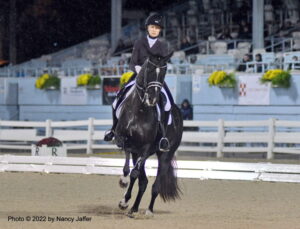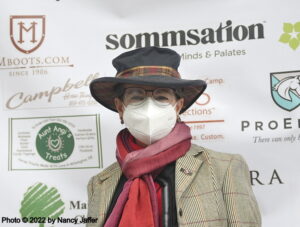Dressage at Devon is a magical name. Over the years, it has conjured inspiration for thousands of riders to do whatever it takes so they can ride in the famous Dixon Oval and become a part of history.
It happened last night for Alice Tarjan, who won the Grand Prix Freestyle qualifier with Serenade MF, the U.S. Equestrian Federation national Grand Prix champion. She fulfilled a dream that was born in desperation.
“I think the first time I came to Devon was like 2006. I had cancer, and no hair and my wig on or whatever and said, ‘This is so cool. If I can live long enough, I want to come and ride here,’” she recalled after collecting the blue ribbon for her 71.804 percent score on Serenade.
The way to be sure of having an entry accepted was to compete in the Materiale for young horses, since there is no qualifying requirement.
She said to herself, “I’ll go buy a foal and I’ll wait until it’s three years old and I’ll ride Materiale,” and thus she made it happen.
That horse was Somer Hit, whom she trained to Grand Prix. The U.S.-bred Serenade (Sir Donnerhall X Don Principe) is another she bought as a foal and took even further, having been the alternate for the world championships team this summer.
But there were only nine horses Friday in the Grand Prix for Freestyle, and just two in the Grand Prix for the Special, both of which are highlights of the Saturday program at DAD. What once was a magnet for many of the country’s top riders is no longer an ambition shared nationally.
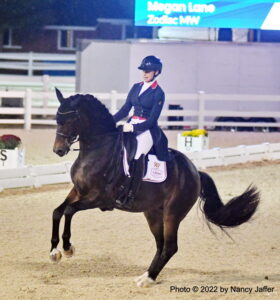
Canada’s Megan Lane was runner-up in the Grand Prix for Freestyle on Zodiac MW with a score of 67 percent. (Photo © 2022 by Nancy Jaffer)
Alice, who lives in Oldwick, N.J., characterized the show as more of a regional fixture than a national one, and DAD’s president, Anne Moss, doesn’t disagree.
“If you look around, we’re sort of alone in the room as far as CDI’s (FEI competition) go. They tried to run one in New Jersey this summer and it cancelled. All the ones in New England have cancelled,” said Anne.
Originally, the plan was to have a CDI at Saugerties, N.Y., then have the riders come to DAD and finally head to Tryon, N.C. on their way to Florida. But the concept failed to pan out when Saugerties didn’t happen.
Here’s what the situation boils down to: “it’s very, very difficult to compete with Wellington,” observed Anne, who is in her first term in the post.
The Florida winter circuit has become a magnet for riders from all over the U.S., many of whom have bought farms in Wellington or neighboring Loxahatchee.
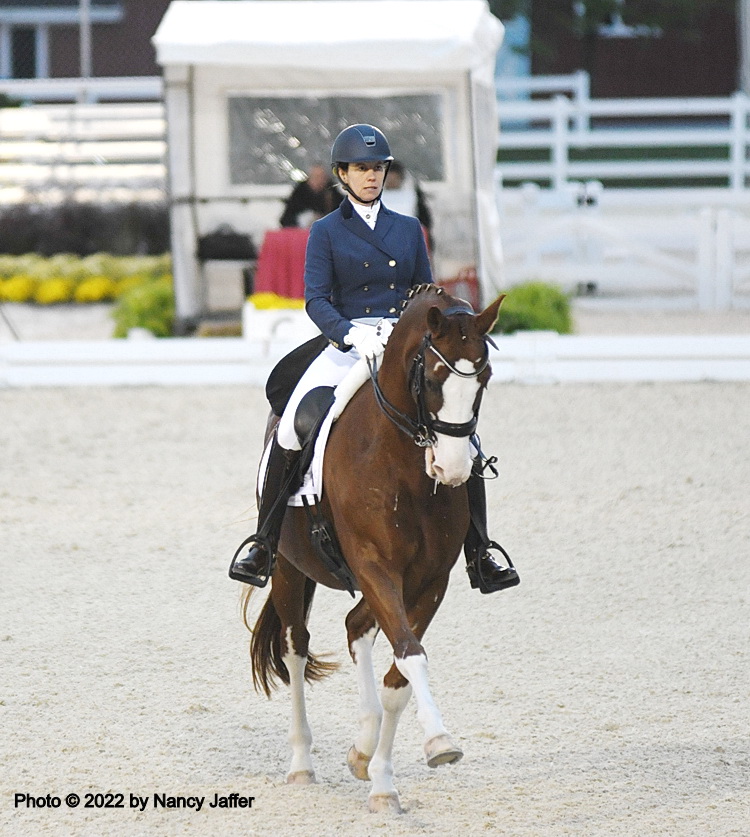
Micaela Mabragana on Diamond Rosso won the Grand Prix for Special, which only attracted one other exhibitor. (Photo © 2022 by Nancy Jaffer)
Anne (and I) had thought that with Devon being a qualifier for next year’s FEI World Cup Finals in Omaha, the first finals in the U.S. since 2017, it would get more riders for the freestyle than in recent years. But no.
However, DAD is not just accepting what has happened. Do not doubt that it is working to have a future.
International judge Anne Gribbons, U.S. Dressage Federation President George Williams and professional J.J. Tate have been recruited for the show’s board, because “they have connections with those people that are competing at a high-performance level.”
At the same time, Anne conceded, “It really is hard to haul their horses from Florida to Pennsylvania for a CDI when they can sort of roll out of bed and do one in Wellington. It’s the biggest challenge we have. It’s frustrating.”
Speaking of frustration, Anne was sidelined during most of the show with Covid, but she continued working in her post from home.
The good news about the show, Anne said, is that “it has the biggest amateur CDI in the country, which is pretty tremendous.”
The thing is, “people want to come and watch the Grand Prix Freestyle, that’s when they show up.”
They did, however, come to a Thursday Master Class, something new, featuring Olympic team silver medalist Sabine Schut-Kery.
But Anne pointed out fans should also come for the show’s final day if they like to watch horses performing to music.
“The Sunday is all freestyles, it doesn’t matter if it’s a junior freestyle (better music?) and I bet our stands will not be filled,” she said with a tinge of sadness in her voice.
When I asked if DAD can survive, she replied, “What would the area look like without Dressage at Devon? It really is a community center for participants, volunteers and spectators. I think it’s way too valuable to say, `No one shows here, let’s forget it.’
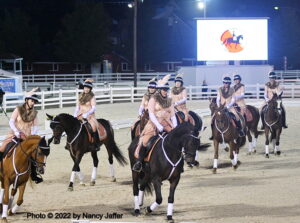
The Delaware Valley Combined Training Association presented a fun quadrille team ride with a roaring 20s theme. (Photo © 2022 by Nancy Jaffer)
“I think the bottom line can be secured if we get enough support from spectators, sponsors and vendors. The budget is nearly $900,000.
“Two thirds can be covered by income from spectators and competitors. The rest has to be filled by sponsors and vendors, and we’ve struggled to do that in the past.”
To counteract that trend, Lisa Engel was hired this year as sponsor/vendor coordinator and Nicole del Giorno, a professional nonprofit fundraiser, is on the board.
“We’re trying to get a capital campaign for the show off the ground so we have more of a cushion,” Anne reported.
“It’s a tremendous amount of money to rent that showgrounds,” she continued, but without it “you would lose that incredible historic ambience.”
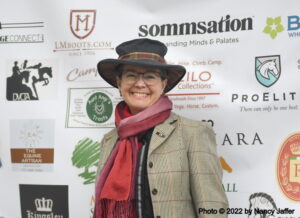
What Anne Moss looks like without her mask. (Don’t worry, I was using a long lens.) (Photo © 2022 by Nancy Jaffer)
DAD did a smart thing by hiring Australian Guy McLean, who does a wonderful act with his horses from Down Under.
Their relationship with him enables him to perform some remarkable stunts, such as having three horses stand over one of their pals lying down in the arena.
Exhibitions of that caliber say something about the quality of the show.
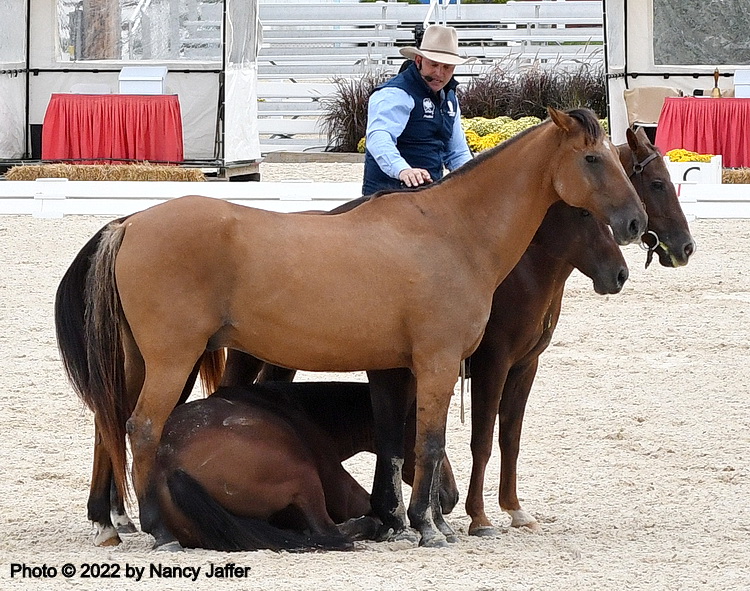
Loved the cooperation of Guy McLean’s horses as they stood with him over one of their pals lying down. (Photo © 2022 by Nancy Jaffer)
Then there was the Delaware Valley Combined Training Association quadrille team, which had a Roaring ’20s theme with music to match. How those riders could make it through the ride in glittering sleeveless dresses (over breeches) with only elbow-length white gloves to keep them warm was impressive.
That’s the kind of dedication characteristic of Dressage at Devon.
For show results, click on this link.


